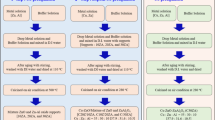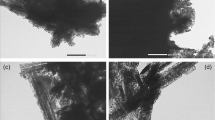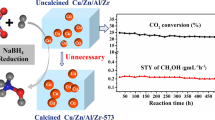Abstract
Our group’s studies on Cu/ZnO-based catalysts for methanol synthesis via hydrogenation of CO2 and for the water-gas shift reaction are reviewed. Effects of ZnO contained in supported Cu-based catalysts on their activities for several reactions were investigated. The addition of ZnO to Cu-based catalyst supported on Al2O3, ZrO2 or SiO2 improved its specific activity for methanol synthesis and the reverse water-gas shift reaction, but did not improve its specific activity for methanol steam reforming and the water-gas shift reaction. Methanol synthesis from CO2 and H2 over Cu/ZnO-based catalysts was extensively studied under a joint research project between National Institute for Resources and Environment (NIRE; one of the former research institutes reorganized to AIST) and Research Institute of Innovative Technology for the Earth (RITE). It was suggested that methanol should be produced via the hydrogenation of CO2, but not via the hydrogenation of CO, and that H2O produced along with methanol should greatly suppress methanol synthesis. The Cu/ZnO-based multicomponent catalysts such as Cu/ZnO/ZrO2/Al2O3 and Cu/ZnO/ZrO2/Al2O3/Ga2O3 were highly active for methanol synthesis from CO2 and H2. The addition of a small amount of colloidal silica to the multicomponent catalysts greatly improved their long-term stability during methanol synthesis from CO2 and H2. The purity of the crude methanol produced in a bench plant was 99.9 wt% and higher than that of the crude methanol from a commercial methanol synthesis from syngas. The water-gas shift reaction over Cu/ZnO-based catalysts was also studied. The activity of Cu/ZnO/ZrO2/Al2O3 catalyst for the water-gas shift reaction at 523 K was less affected by the pre-treatments such as calcination and treatment in H2 at high temperatures than that of the Cu/ZnO/Al2O3 catalyst. Accordingly, the Cu/ZnO/ZrO2/Al2O3 catalyst was considered to be more suitable for practical use for the water-gas shift reaction. The Cu/ZnO/ZrO2/Al2O3 catalyst was also highly active for the water-gas shift reaction at 673 K. Furthermore, a two-stage reaction system composed of the first reaction zone for the water-gas shift reaction at 673 K and the second reaction zone for the reaction at 523 K was found to be more efficient than a one-stage reaction system. The addition of a small amount of colloidal silica to a Cu/ZnO-based catalyst greatly improved its long-term stability in the water-gas shift reaction in a similar manner as in methanol synthesis from CO2 and H2.
Similar content being viewed by others
Author information
Authors and Affiliations
Corresponding author
Rights and permissions
About this article
Cite this article
Saito, M., Murata, K. Development of high performance Cu/ZnO-based catalysts for methanol synthesis and the water-gas shift reaction. Catal Surv Asia 8, 285–294 (2004). https://doi.org/10.1007/s10563-004-9119-y
Issue Date:
DOI: https://doi.org/10.1007/s10563-004-9119-y




